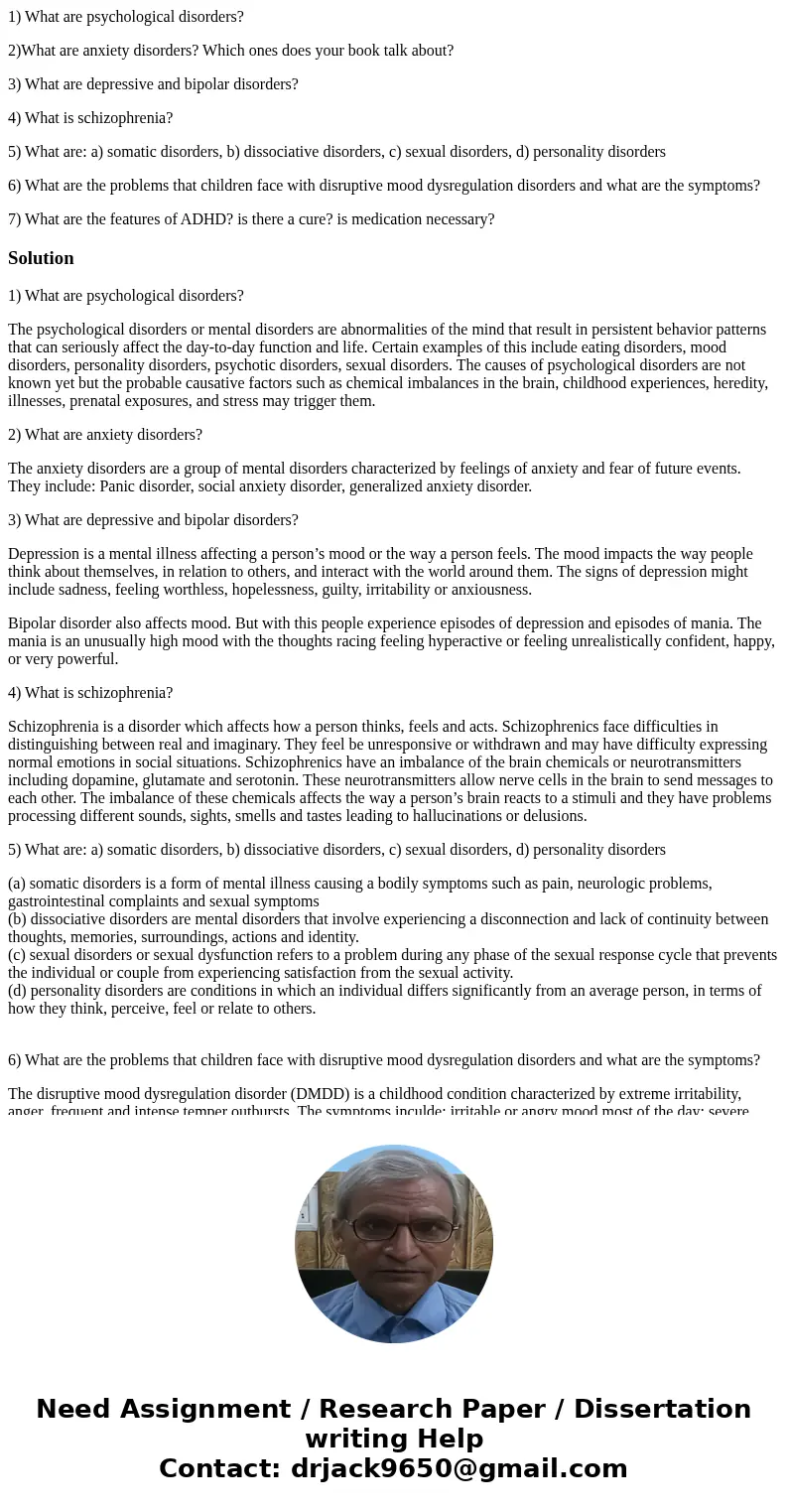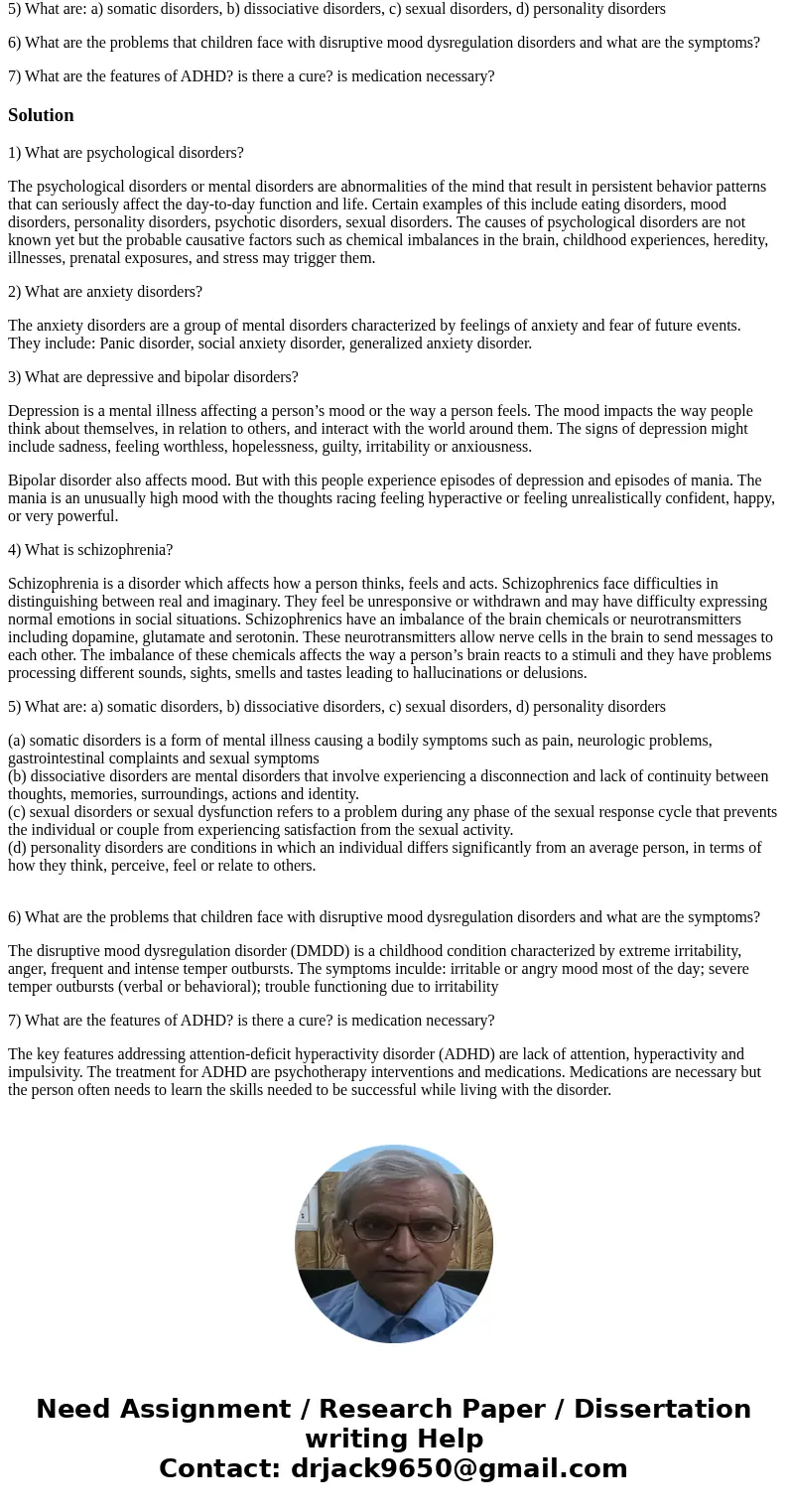1 What are psychological disorders 2What are anxiety disorde
1) What are psychological disorders?
2)What are anxiety disorders? Which ones does your book talk about?
3) What are depressive and bipolar disorders?
4) What is schizophrenia?
5) What are: a) somatic disorders, b) dissociative disorders, c) sexual disorders, d) personality disorders
6) What are the problems that children face with disruptive mood dysregulation disorders and what are the symptoms?
7) What are the features of ADHD? is there a cure? is medication necessary?
Solution
1) What are psychological disorders?
The psychological disorders or mental disorders are abnormalities of the mind that result in persistent behavior patterns that can seriously affect the day-to-day function and life. Certain examples of this include eating disorders, mood disorders, personality disorders, psychotic disorders, sexual disorders. The causes of psychological disorders are not known yet but the probable causative factors such as chemical imbalances in the brain, childhood experiences, heredity, illnesses, prenatal exposures, and stress may trigger them.
2) What are anxiety disorders?
The anxiety disorders are a group of mental disorders characterized by feelings of anxiety and fear of future events.
They include: Panic disorder, social anxiety disorder, generalized anxiety disorder.
3) What are depressive and bipolar disorders?
Depression is a mental illness affecting a person’s mood or the way a person feels. The mood impacts the way people think about themselves, in relation to others, and interact with the world around them. The signs of depression might include sadness, feeling worthless, hopelessness, guilty, irritability or anxiousness.
Bipolar disorder also affects mood. But with this people experience episodes of depression and episodes of mania. The mania is an unusually high mood with the thoughts racing feeling hyperactive or feeling unrealistically confident, happy, or very powerful.
4) What is schizophrenia?
Schizophrenia is a disorder which affects how a person thinks, feels and acts. Schizophrenics face difficulties in distinguishing between real and imaginary. They feel be unresponsive or withdrawn and may have difficulty expressing normal emotions in social situations. Schizophrenics have an imbalance of the brain chemicals or neurotransmitters including dopamine, glutamate and serotonin. These neurotransmitters allow nerve cells in the brain to send messages to each other. The imbalance of these chemicals affects the way a person’s brain reacts to a stimuli and they have problems processing different sounds, sights, smells and tastes leading to hallucinations or delusions.
5) What are: a) somatic disorders, b) dissociative disorders, c) sexual disorders, d) personality disorders
(a) somatic disorders is a form of mental illness causing a bodily symptoms such as pain, neurologic problems, gastrointestinal complaints and sexual symptoms
(b) dissociative disorders are mental disorders that involve experiencing a disconnection and lack of continuity between thoughts, memories, surroundings, actions and identity.
(c) sexual disorders or sexual dysfunction refers to a problem during any phase of the sexual response cycle that prevents the individual or couple from experiencing satisfaction from the sexual activity.
(d) personality disorders are conditions in which an individual differs significantly from an average person, in terms of how they think, perceive, feel or relate to others.
6) What are the problems that children face with disruptive mood dysregulation disorders and what are the symptoms?
The disruptive mood dysregulation disorder (DMDD) is a childhood condition characterized by extreme irritability, anger, frequent and intense temper outbursts. The symptoms inculde: irritable or angry mood most of the day; severe temper outbursts (verbal or behavioral); trouble functioning due to irritability
7) What are the features of ADHD? is there a cure? is medication necessary?
The key features addressing attention-deficit hyperactivity disorder (ADHD) are lack of attention, hyperactivity and impulsivity. The treatment for ADHD are psychotherapy interventions and medications. Medications are necessary but the person often needs to learn the skills needed to be successful while living with the disorder.


 Homework Sourse
Homework Sourse